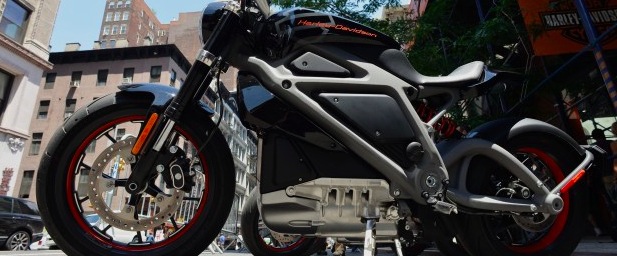Harley-Davidson Signals Climate Change Is Mainstream

How do we know our distributed solution has gone mainstream? Harley-Davidson, whose brand is arguably nonexistent without a combustion engine, just introduced an electric motorcycle. The dominant brand in motorcycles, Harley sells 36 percentof all motorcycles sold in the U.S., including 52 percent of all on-highway bikes. It has a well-entrenched formula for customer loyalty that includes its unique sound. That’s so important that the company tried to trademark it, only giving up in 2000 after six years of legal wrangling.
But Harley’s core customers are largely boomers so its average customer’s age — and as recently as 2010 its market share too — were declining.
The company needed to appeal to younger generations. It’s doing so with smaller, cheaper bikes and an electric motorcycle called the LiveWire.
How does a company capitalize on one of the most beloved parts of an electric vehicle, its silence, when your brand is synonymous with deafening noise? By creating a brand new sound. As Charles Fleming wrote in the Los Angeles Timeslast week:
The (Livewire) debut marks a dramatic departure for the 110-year-old motorcycle company, which is hailed or hated for its powerful engines, loud exhaust pipes and brash rebel attitude … It accelerates like a ballistic missile and sounds like a jet engine turbine.
As LiveWire designer Kirk Rasmussen said, “People get on this thinking ‘golf cart,’ but they get off it thinking ‘rocket ship. “…That should appeal to younger male riders in particular, while the electric aspect should appeal to younger riders of both genders, who tend to be more sensitive to environmental (sic) matters.
There are many more dramatic innovations happening in emerging companies, like mushroom architecture described last week in Huffington Post — stunning structures that grow themselves and are completely recyclable. But there are just as potentially meaningful changes in existing product lines from industry leaders, such as J.P. Morgan Chase’s bond funds for green projects.
Environmental efforts under the CSR rubric are also advancing. Most stunning for those of us who follow Apple Computer and its storied founder Steve Job’s rejection of social responsibility is new founder Tim Cook’s embrace of “better“ ideas for reducing its environmental footprint. Stock market website SeekingAlphareports on Apple’s change of heart:
The company was one of Greenpeace’s Do Not Buys for a long period of time. Yet in the past year Greenpeace has been applauding Apple for eliminating toxic materials, materials in conflict areas, and setting a bar in 2014 for climate leadership. The company is now using 100 percent renewable energy at all data centers, which is settig the bar in the tech space.
These mainstream solutions are most remarkable when you realize they are happening independently, across industries, across companies, even when the innovations appear to undercut a successful, established brand, as in the case of Harley-Davidson.
From companies to individuals to institutions, everyone seems to be a part of the distributed solution. Conservative government and business leaders advocate climate change action in a just released report “Risky Business.” Millennials are moving away from private car ownership. And Harleys may soon sound like jet engines… or nothing at all.
Originally published July 11, 2014.
Photo courtesy of Mark Baker.

